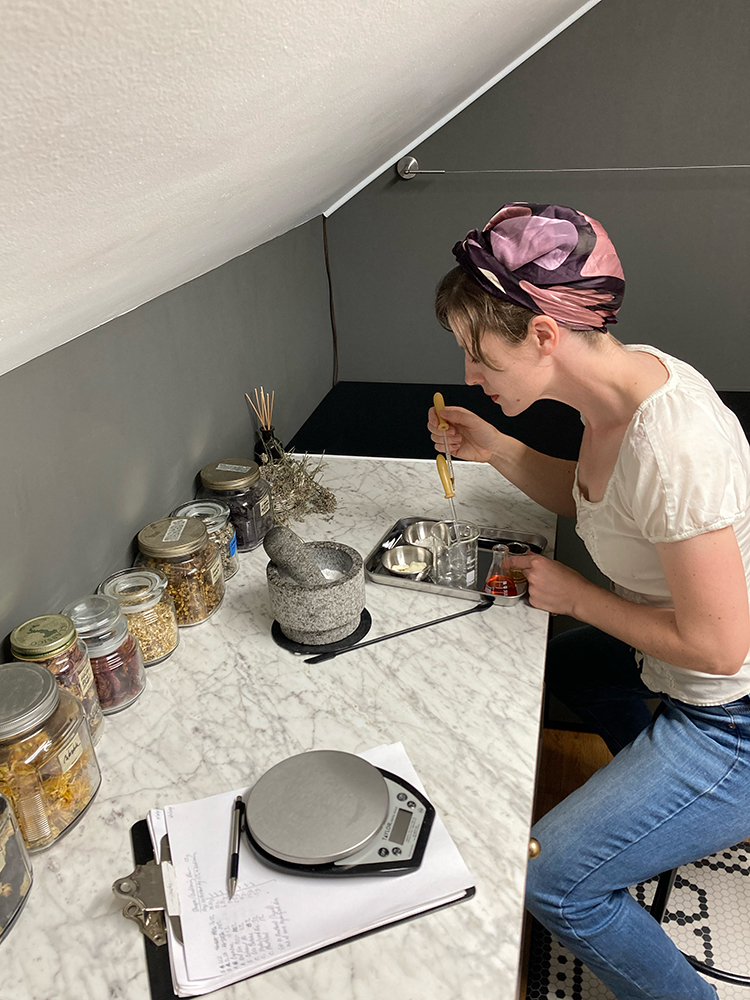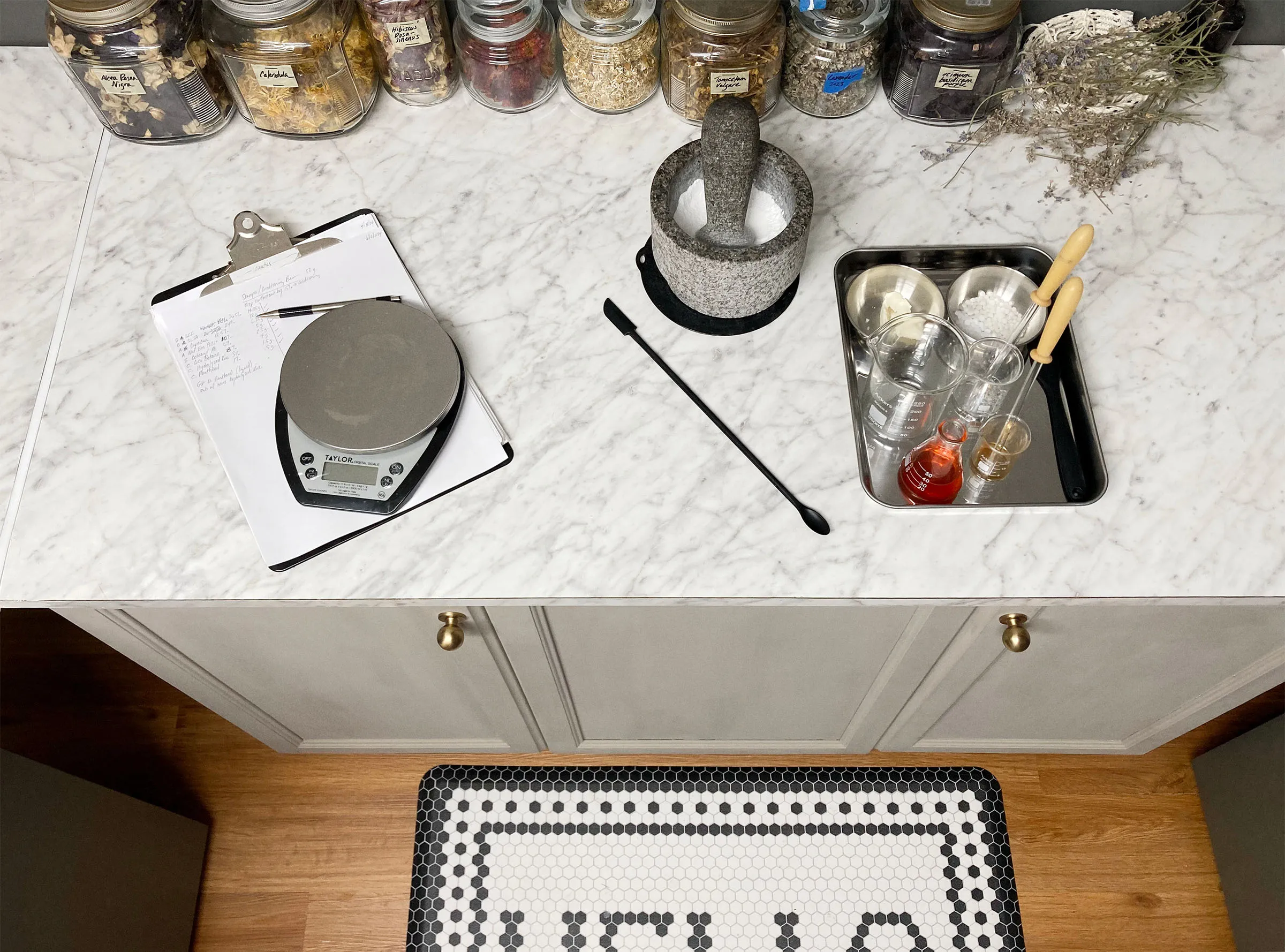Foundations
For me creating is one part science : one part art; and that is my achilles heel. I can be lost for days.
After 20 years in fashion, luxury goods and beauty, Mary “Mamie” Ritzel launches indie beauty and home decor brand, Isola and Théo Mercantile.
As an artist, I have always immersed myself headlong into creating beautiful and useful things. As a designer I have been part of product development at every level. We all look at products differently. While some are wholly utilitarian and functional, others crush hard on brand reputation. I sit firmly in the middle. And I love when customers are all in on something they buy; to them it’s not just an object on a shelf. But consumable products are different than a statement bag. It has a function and should have an endlife designed into it. Use it well, use it up, and when discarded, do as little harm as possible. No matter how beautifully a product is presented, en masse in landfills it certainly becomes less so.
Our products should not outlive us and that burden often ends up overseas. It’s quite outrageous, and should outrage us. But packaging, research and development is ever evolving in this industry, and the advantage of being a designer is the ability to adapt and change course.

Mamie Ritzel
Lover of form. My heart is happy when my hands are busy. Hunting the beautiful and tickling the corner of your mouth.
Foundations
My kitchen was the early focus in creating natural cleaners and wood oils. When you live in major cities you’re always thinking about clean, or how to find it. Seeing so much greenwashing in products claiming to be green that contained really hazardous, non-biodegradable ingredients both shocked and disappointed me. What’s a gal to do but make and share simple, effective solutions with friends. 20 years later I’ve never looked back, saving money and plastic from ever making it to the landfill.

It can’t be understated how practical wood cutting boards are. They can be cleaned, honed and conditioned so easily, and they’re beautiful to look at. Making my own blend of oils and waxes for my boards and butcher block top is supremely satisfying. And while liquid soap is convenient, I’d argue it’s no more convenient than a simple, sculptural bar of soap in a dish. Later when I lived in Airbnb after moving to the San Francisco and then again when I moved back to NYC while freelancing, you look at personal products very differently. Bringing around a beautiful bar of soap is much lighter, doesn’t leak and takes up virtually no space. But loving handmade soap is one thing, making it is absolute magic. The first moment I experienced oils and alkali saponifying to make soap it was electric for me. I was absolutely besotted by it. Unmolding soap has the same level of excitement as fishing out a garment or skein from a dye pot or cracking open the kiln to peek at a vitrified piece of art. For me creating is one part science : one part art; and that is my achilles heel. I can be lost for days.
…the advantage of being a designer is the ability adapt and change course.
Soap, candles & skincare
There’s a certain pride in the ability to multitask at work or with busy lives and schedules to coordinate. My multitasking is more about ruminating ideas as I’m constantly in motion, and in project. I suspect soapmaking was a bit intuitive; a bridge between dyeing and sculpture. I really geek out on superfat values, water discounting or playing with saponification levels. Candle making was a much longer journey however, putting it down many times to let ideas work in the background. I’ve spent a couple years developing my wax recipe and testing. Melt point and overall burn temperature to prevent the candle getting overly hot is really important and any chandler is probably the most focused here. Of course fragrance and how much lift or throw it has is what’s important for a consumer but my experience with the environment in a kiln and using candles (in all price ranges that absolutely rage) made me realize this was most important. A little kiln knowledge helped.
From a young age I’ve always loved fragrance. I loved the perfumes my mom had (and rarely wore). When my both grandmothers visited they breezed in dressed so elegantly and smelled so lovely. Interestingly, while my mom never wore much of the perfume she was likely given, she really liked making candles in the 90’s. I’ve marked every new apartment, job, relationship (or breakup) with new scents to mark time with candles and perfume. Just before lockdown while most people were buying food, I stocked up on candles, just in case. Our sense of smell is so primitive. I find it endlessly fascinating how memories are connected to scent. Fine fragrances will follow perhaps in 2025. Slowly slowly, catchee monkey.
The moment oils and alkali saponify to make soap was electric for me. I was absolutely besotted by it.
I started making my own cosmetics and skincare to understand ingredients for my health and the health of the environment. My skin is very sensitive (and fair), and I’ve struggled for so long to find something that felt comfortable. It wasn’t until my skin looked and felt better after making my own that I realized how hard it was to find emulsifiers especially that were environmentally safe and for aquatic life in particular. It is staggering that silicones, acrylics and polymers aren’t regulated in the US for leave on products despite the scientific evidence of how harmful they are to wildlife. Why are there paint thinners and isopropyl alcohol in lipstick is beyond me. I joined Formula Botanica for the same reason I started making my own cleaners; I wanted to find the biodegradable solutions I wasn’t finding easily in my own research. Formula Botanica is a community I am very proud to be a part of and have faith that all indie makers in every industry can have an impact for great change.
Environment
The framework of my conscience has always been focused on the environment. Every decision I make as a consumer considers cradle to grave because we must. With so many products and so much in biotech this is the golden age in our present if we choose to find better substitutes. My love and interest in plants really came from studying permaculture, growing plants for glazes and pigments, and in my current pursuit in restoring my 16 acres property with keystone species at Satis Gardens. My own Homegrown National Park project.
Ingredients for Isola and Théo have been carefully curated. Choosing impact-driven ingredients that support a better ecology and Fair Trade communities are the first touchpoint. Products have to be first and foremost: effective, safe and stable with as little effect on habitat all at the same time. It’s important to distinguish that a material may be natural, but if it disturbs an ecosystem it is not sustainable. A product that’s incredibly buzz-worthy-exotic but so precious, bordering on endangered is not sustainable. There are so many ingredients that are beneficial, and so the choices can become dizzying. Not a bad problem to have. It truly feels like the golden age of bio-everything: engineering, chemistry, medicine, etc. Upcycled ingredients are becoming far more accessible, packaging is finally starting to change, and organic products are becoming the preferred standard. It’s heartening and incredibly exciting.
Social Consciousness
Know thy provenance
We all want and should be paid fairly for our work and it directly reflects how important we feel. We can’t possibly know every aspect of the lifecycle of a raw ingredient so we rely on checks and balances such as Fair Trade, ECOCERT, COSMOS Standard certifications. The agriculture industry is very physical, with long hours and no guarantee of a successful harvest. With no structured guidelines, conditions for humans and animals are often unsafe, unhealthy and very dangerous. It’s not enough to boycott these products outright, and many of our ingredients come from warm climates with no direct substitute in the States. Like rewarding a dog with a treat for good behavior, rewarding good practitioners does far more for the industry than boycotting. Money is a motivating factor. Demanding healthy soil practices with organic products that support growers and their community should become the standard. Responsible organizations that offer education and better technology so everyone can do better. With no corners cut, richer, higher quality artisan products are the result that we directly benefit from. Cheaper, refined products that use chemicals like ethanol and hexane to extract not only significantly reduces the health benefits of the very products we’re buying, but is as unhealthy for our body and the workers that process them. And they’re not only cheaper products. We’d love the idea of candelilla and carnauba wax as vegan alternatives for candles but corrosive extraction chemicals have become very dangerous to those that process them and we can not currently find Fair Trade vendors. Regardless, beeswax needs no processing other than filtering. It’s already a wax. Many shareholders exploit children and animals (monkeys and donkeys) for cheap labor. It’s shameful and morally repugnant. The cost difference between these two frameworks truly is a drop in the bucket. We’ve done the math and it does not shake out. Every child deserves education, and animals with no voice need ours. We have to speak for them.
We rely on these certifiers as our checks and balances when we can’t be there. When our products make our lives more beautiful and healthy it’s such a simple decision to support them too. These core values are the driving force of Isola and Theo. Let’s drive the demand for better.